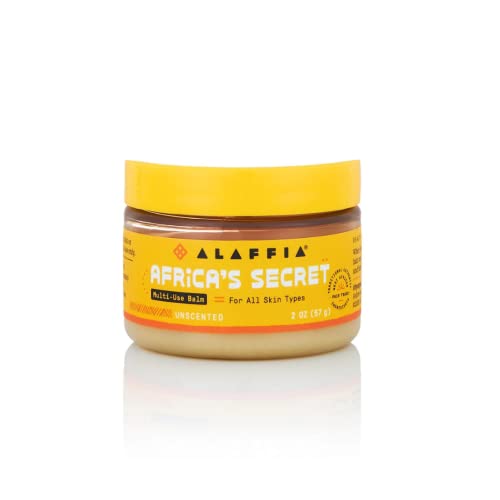
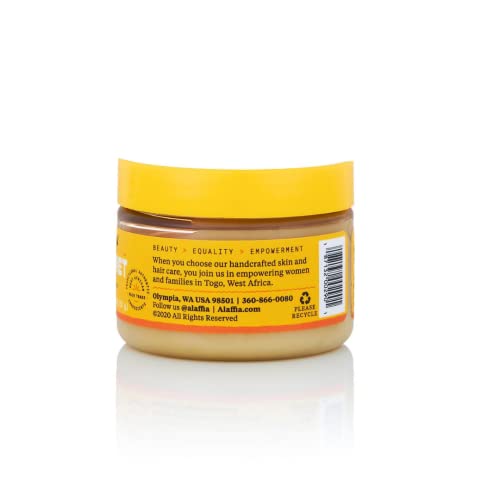
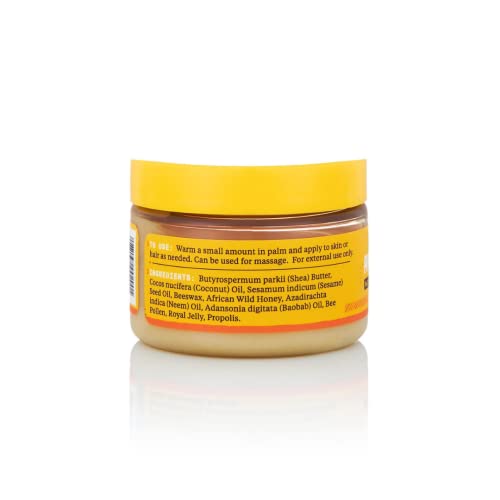
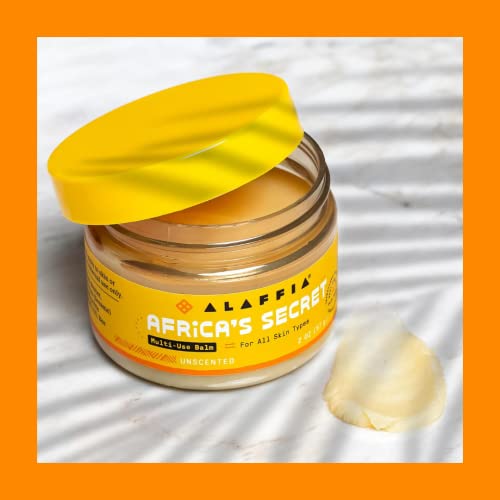
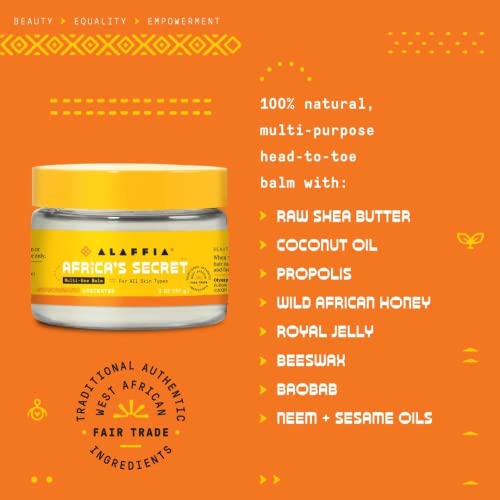
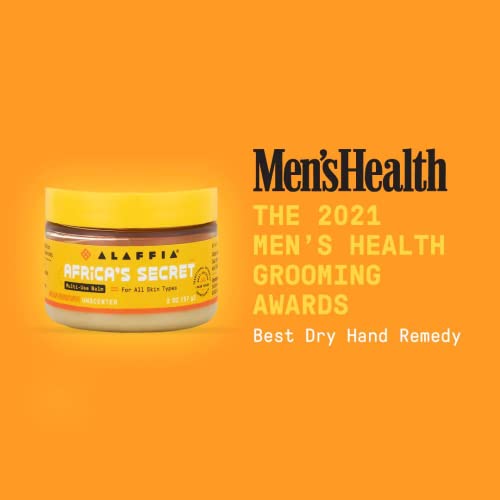
Africa's Secret Body Balm - Handcrafted Moisturizer, Unscented, 2oz


Royal Jelly
Medium RiskRoyal jelly is a pharyngeal secretion of worker bees that serves as a crucial nutrient source for the queen bee and larvae. It is rich in proteins, vitamins, and minerals, often used in dietary supplements and cosmetics for its purported health benefits.
Sustai Insights
Royal jelly offers functional benefits such as nutritional support and potential anti-inflammatory properties. It is generally low risk for carcinogenicity and developmental toxicity, but carries moderate concerns regarding allergenic potential. Environmental risks are minimal, with no significant pollutant or bioaccumulation issues identified. Regulatory status is typically approved, but caution is advised for individuals with bee-related allergies. Overall, the ingredient presents a medium risk profile, warranting careful consideration in sensitive applications.
Beeswax, Yellow
Low RiskBeeswax, yellow, is a natural wax produced by honeybees, primarily composed of esters of fatty acids and long-chain alcohols. It serves as an emulsifier, thickener, and stabilizer in cosmetic formulations, contributing to texture and consistency. It is commonly used in creams, balms, and lip products.
Sustai Insights
Beeswax provides functional benefits such as enhancing product texture and acting as a natural emulsifier, while also being biodegradable and sustainably sourced. Health risks are minimal, with low concerns for carcinogenicity, allergies, or irritations. Environmental impacts are also low, as it does not bioaccumulate. Regulatory status remains favorable with no current restrictions. Overall, the ingredient poses low risk, making it a suitable choice in cosmetic formulations.
Sesamum Indicum (Sesame) Oil
Low RiskSesamum indicum (sesame) oil is derived from the seeds of the sesame plant. It is commonly used in cosmetic formulations due to its emollient properties and ability to nourish the skin. This oil is rich in fatty acids and antioxidants, contributing to its effectiveness in various skincare products.
Sustai Insights
Sesame oil offers several functional benefits, including moisturization and nourishment for the skin, along with potential antioxidant properties. It is generally regarded as safe, with low concerns regarding carcinogenicity, allergies, and reproductive toxicity. Environmental risks are minimal, and the oil is not known to be bioaccumulative. Regulatory bodies do not impose significant restrictions on its use. Overall, sesame oil poses a low risk, making it a viable ingredient in cosmetic formulations, although consumers should consider potential allergies and choose responsibly sourced products.
Cocos Nucifera (Coconut) Oil
Low RiskCocos Nucifera (Coconut) Oil is derived from the kernels of the coconut palm. It is primarily used in cosmetic formulations for its emollient and moisturizing properties, making it suitable for skin and hair care products.
Sustai Insights
Coconut oil serves as an effective moisturizer and emollient, promoting skin hydration and softness. It is sustainably sourced and biodegradable. Health risks are minimal, with low concerns regarding carcinogenicity, allergens, and reproductive toxicity. Environmental impact is also low, as it does not contribute significantly to pollution or bioaccumulation. Regulatory bodies have not issued restrictions on its use. Overall, coconut oil presents a low risk for health and environmental concerns, making it a safe ingredient in cosmetic products.
Azadirachta Indica (Neem) Seed Oil
Low RiskAzadirachta indica (neem) seed oil is derived from the seeds of the neem tree. It is commonly used in cosmetic and personal care products for its potential properties as an emollient and its traditional use in herbal medicine. Its applications include skin care, hair care, and as an insect repellent.
Sustai Insights
Neem seed oil offers functional benefits such as moisturizing and potential antimicrobial properties, making it useful in personal care formulations. It is considered sustainably sourced and biodegradable. Health risks are low, with minimal concerns regarding carcinogenicity, allergies, or reproductive toxicity. Environmental risks are also low, with no significant pollutant or bioaccumulation potential. Regulatory status shows no current restrictions. Overall, it is assessed to have a low risk, making it a favorable choice in formulations.
Butyrospermum Parkii (Shea) Butter
Low RiskButyrospermum parkii (shea) butter is a vegetable fat derived from the nuts of the shea tree. It is commonly used in cosmetic formulations for its emollient properties, providing moisture and improving skin texture. Additionally, shea butter is known for its ability to enhance the stability of products and deliver a creamy texture.
Sustai Insights
Shea butter offers functional benefits as an effective moisturizer, enhancing skin barrier function and texture. It is sustainably sourced and biodegradable, contributing to eco-friendliness. Health-wise, it is associated with low risks for carcinogenicity, allergies, and reproductive toxicity. Environmental impacts are minimal, with no significant pollutant potential identified. Regulatory assessments indicate no current restrictions. Overall, the ingredient presents a low risk, making it a favorable choice in cosmetic formulations.
Bee Pollen
Low RiskBee pollen is a natural substance collected by bees from the male parts of flowers. It is often used in dietary supplements and cosmetic products due to its nutritional content, including vitamins, minerals, proteins, and antioxidants. It is recognized for its potential health benefits and is sometimes believed to support energy and immune function.
Sustai Insights
Bee pollen is valued for its nutritional properties and is considered a natural source of vitamins and antioxidants, contributing positively to health. It is sustainably sourced and biodegradable. Health risks are minimal, with low concerns regarding carcinogenicity, allergies, or reproductive toxicity. Environmental hazards are negligible, and there are no significant regulatory restrictions. Overall, it presents a low-risk profile, making it a suitable ingredient in various products.
Propolis
Low RiskPropolis is a resinous substance produced by bees from plant materials, primarily used in cosmetic and medicinal products for its potential antimicrobial properties. It acts as a natural preservative and may contribute to product stability.
Sustai Insights
Propolis offers functional benefits such as antimicrobial properties and potential skin protection. It is sustainably sourced and biodegradable. Health risks are minimal, with low concerns for carcinogenicity, allergies, or reproductive toxicity. Environmentally, it poses low pollution or bioaccumulation risks. Regulatory status shows no current restrictions. Overall, propolis is assessed as low risk, with safe usage practices recommended. Alternatives include other natural preservatives like rosemary extract.
Beeswax, Yellow
Low RiskBeeswax, yellow, is a natural wax produced by honeybees, primarily composed of esters of fatty acids and long-chain alcohols. It serves as an emulsifier, thickener, and stabilizer in cosmetic formulations, contributing to texture and consistency. It is commonly used in creams, balms, and lip products.
Sustai Insights
Beeswax provides functional benefits such as enhancing product texture and acting as a natural emulsifier, while also being biodegradable and sustainably sourced. Health risks are minimal, with low concerns for carcinogenicity, allergies, or irritations. Environmental impacts are also low, as it does not bioaccumulate. Regulatory status remains favorable with no current restrictions. Overall, the ingredient poses low risk, making it a suitable choice in cosmetic formulations.
Sesamum Indicum (Sesame) Oil
Low RiskSesamum indicum (sesame) oil is derived from the seeds of the sesame plant. It is commonly used in cosmetic formulations due to its emollient properties and ability to nourish the skin. This oil is rich in fatty acids and antioxidants, contributing to its effectiveness in various skincare products.
Sustai Insights
Sesame oil offers several functional benefits, including moisturization and nourishment for the skin, along with potential antioxidant properties. It is generally regarded as safe, with low concerns regarding carcinogenicity, allergies, and reproductive toxicity. Environmental risks are minimal, and the oil is not known to be bioaccumulative. Regulatory bodies do not impose significant restrictions on its use. Overall, sesame oil poses a low risk, making it a viable ingredient in cosmetic formulations, although consumers should consider potential allergies and choose responsibly sourced products.
Royal Jelly
Medium RiskRoyal jelly is a pharyngeal secretion of worker bees that serves as a crucial nutrient source for the queen bee and larvae. It is rich in proteins, vitamins, and minerals, often used in dietary supplements and cosmetics for its purported health benefits.
Sustai Insights
Royal jelly offers functional benefits such as nutritional support and potential anti-inflammatory properties. It is generally low risk for carcinogenicity and developmental toxicity, but carries moderate concerns regarding allergenic potential. Environmental risks are minimal, with no significant pollutant or bioaccumulation issues identified. Regulatory status is typically approved, but caution is advised for individuals with bee-related allergies. Overall, the ingredient presents a medium risk profile, warranting careful consideration in sensitive applications.
Cocos Nucifera (Coconut) Oil
Low RiskCocos Nucifera (Coconut) Oil is derived from the kernels of the coconut palm. It is primarily used in cosmetic formulations for its emollient and moisturizing properties, making it suitable for skin and hair care products.
Sustai Insights
Coconut oil serves as an effective moisturizer and emollient, promoting skin hydration and softness. It is sustainably sourced and biodegradable. Health risks are minimal, with low concerns regarding carcinogenicity, allergens, and reproductive toxicity. Environmental impact is also low, as it does not contribute significantly to pollution or bioaccumulation. Regulatory bodies have not issued restrictions on its use. Overall, coconut oil presents a low risk for health and environmental concerns, making it a safe ingredient in cosmetic products.
Azadirachta Indica (Neem) Seed Oil
Low RiskAzadirachta indica (neem) seed oil is derived from the seeds of the neem tree. It is commonly used in cosmetic and personal care products for its potential properties as an emollient and its traditional use in herbal medicine. Its applications include skin care, hair care, and as an insect repellent.
Sustai Insights
Neem seed oil offers functional benefits such as moisturizing and potential antimicrobial properties, making it useful in personal care formulations. It is considered sustainably sourced and biodegradable. Health risks are low, with minimal concerns regarding carcinogenicity, allergies, or reproductive toxicity. Environmental risks are also low, with no significant pollutant or bioaccumulation potential. Regulatory status shows no current restrictions. Overall, it is assessed to have a low risk, making it a favorable choice in formulations.
Butyrospermum Parkii (Shea) Butter
Low RiskButyrospermum parkii (shea) butter is a vegetable fat derived from the nuts of the shea tree. It is commonly used in cosmetic formulations for its emollient properties, providing moisture and improving skin texture. Additionally, shea butter is known for its ability to enhance the stability of products and deliver a creamy texture.
Sustai Insights
Shea butter offers functional benefits as an effective moisturizer, enhancing skin barrier function and texture. It is sustainably sourced and biodegradable, contributing to eco-friendliness. Health-wise, it is associated with low risks for carcinogenicity, allergies, and reproductive toxicity. Environmental impacts are minimal, with no significant pollutant potential identified. Regulatory assessments indicate no current restrictions. Overall, the ingredient presents a low risk, making it a favorable choice in cosmetic formulations.
Bee Pollen
Low RiskBee pollen is a natural substance collected by bees from the male parts of flowers. It is often used in dietary supplements and cosmetic products due to its nutritional content, including vitamins, minerals, proteins, and antioxidants. It is recognized for its potential health benefits and is sometimes believed to support energy and immune function.
Sustai Insights
Bee pollen is valued for its nutritional properties and is considered a natural source of vitamins and antioxidants, contributing positively to health. It is sustainably sourced and biodegradable. Health risks are minimal, with low concerns regarding carcinogenicity, allergies, or reproductive toxicity. Environmental hazards are negligible, and there are no significant regulatory restrictions. Overall, it presents a low-risk profile, making it a suitable ingredient in various products.
Propolis
Low RiskPropolis is a resinous substance produced by bees from plant materials, primarily used in cosmetic and medicinal products for its potential antimicrobial properties. It acts as a natural preservative and may contribute to product stability.
Sustai Insights
Propolis offers functional benefits such as antimicrobial properties and potential skin protection. It is sustainably sourced and biodegradable. Health risks are minimal, with low concerns for carcinogenicity, allergies, or reproductive toxicity. Environmentally, it poses low pollution or bioaccumulation risks. Regulatory status shows no current restrictions. Overall, propolis is assessed as low risk, with safe usage practices recommended. Alternatives include other natural preservatives like rosemary extract.
Discover Africa's Secret Multi-Use Balm, Unscented, a handcrafted body balm designed for ultimate hydration and nourishment. This versatile balm is perfect for addressing dry skin and restoring moisture without any added fragrance, making it suitable for sensitive skin.
- Nourishing Ingredients: Enriched with shea butter, coconut oil, and baobab oil, this balm deeply hydrates and promotes skin elasticity.
- Multi-Use Formula: Ideal for dry patches on skin, hair, or even as a lip balm, providing flexible solutions for everyday care.
- Sustainable Sourcing: Crafted with ethically sourced ingredients, supporting community initiatives and promoting environmental sustainability.
- Easy Application: Simply warm a small amount in your hands and massage onto the desired area for immediate relief and moisture.
- No Harsh Additives: Free from synthetic fragrances and harmful chemicals, ensuring a gentle experience for all skin types.
This multi-use balm not only enhances your beauty routine but also supports a healthier planet.
Subscribe & Save with Sustai
- Best Price Guarantee: Always enjoy the lowest prices on sustainable home essentials.
- No Surprises: We’ll notify you before shipping. No hidden fees, ever.
- You’re in Charge: Change, pause, or cancel your subscription anytime with ease.
- Eco-Friendly Deliveries: Our grouped shipments mean less packaging and lower emissions.
Join us on a sustainable journey. Special offers for a limited time! Prices and promotions may change.
Recommended Products
Discover Africa's Secret Multi-Use Balm, Unscented, a handcrafted body balm designed for ultimate hydration and nourishment. This versatile balm is perfect for addressing dry skin and restoring moisture without any added fragrance, making it suitable for sensitive skin.
- Nourishing Ingredients: Enriched with shea butter, coconut oil, and baobab oil, this balm deeply hydrates and promotes skin elasticity.
- Multi-Use Formula: Ideal for dry patches on skin, hair, or even as a lip balm, providing flexible solutions for everyday care.
- Sustainable Sourcing: Crafted with ethically sourced ingredients, supporting community initiatives and promoting environmental sustainability.
- Easy Application: Simply warm a small amount in your hands and massage onto the desired area for immediate relief and moisture.
- No Harsh Additives: Free from synthetic fragrances and harmful chemicals, ensuring a gentle experience for all skin types.
This multi-use balm not only enhances your beauty routine but also supports a healthier planet.

You can have at most 2 Sustainable Steals products in your cart
Customer Reviews
Customers’ View
Customers appreciate the nourishing and effective qualities of the Multi-Use Balm | Unscented, highlighting its ability to soften and hydrate skin without added fragrance, making it suitable for sensitive individuals. Many users commend its deep moisturizing properties, describing it as soothing and effective for dry skin, with some noting improvements in complexion and reductions in acne scars. The product's handcrafted quality and ethical sourcing resonate well with environmentally conscious consumers, as does its eco-friendly packaging. However, opinions are mixed regarding its thickness and greasiness, with some preferring nighttime use to allow for better absorption. Overall, customers find this balm to be a valuable addition to their skincare routines, aligning well with their health and sustainability values.
AI-generated from the text of customer reviewsThis product has no reviews yet.




